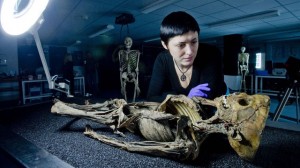A 13th century skeleton buried on the grounds of a friary in Ipswich, England, is of Tunisian origin. Nobody knows how he got all the way to England, but he lived there for at least 10 years before he died of a spinal abscess. The body was discovered in the 1990s. It’s only now that analysis has revealed his unusual background.
“It’s not just the skin tone; it’s a question of bone structure,” said Xanthe Mallett, an expert at the Center for Anatomy and Human Identification in Dundee. She said the size of the nasal bone or the shape of the orbits differed depending on whether skeletons were European or African.
“You can have an idea of where somebody is from by looking at their skeletal features,” she said.
Researchers were able to pin the man to Tunisia using isotope analysis, a technique which looks at the mix of elements that build up in a person’s teeth, bones or other tissues. Since people from different areas tend to accumulate such elements in different ways, analysis of their remains can sometimes pinpoint where they grew up, where they lived or even their diet.
“Each area has a different isotopic signature,” she said.
Carbon dating puts the skeleton to 1190-1300 A.D., at least 150 years older than the earliest post-Roman records of black people in England. There were people of African extraction in England under Rome — some slaves and soldiers, the 4th century “Ivory Bangle Lady” found buried in York — but then there’s a thousand year gap before 3 black people are mentioned in tax records.
Since he was buried in the friary, he must have been Christian, possibly a convert brought to England by Lord Tiptoth, the founder of the friary, upon his return from the 9th Crusade.
